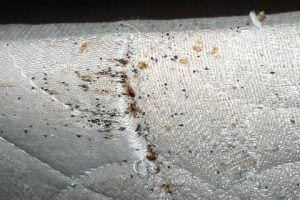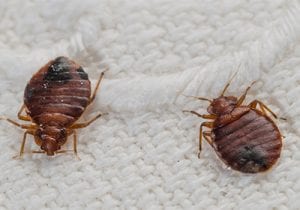Bed Bugs, the facts you should know, don’t let bed bugs invade your home, bed bugs are notorious hitchhikers and bugs are happy to stay anywhere! That’s why Pest2Kill are here to provide an expert termination, Bed Bug Removal and effective pest control service.
Bed Bug Facts, things you should know.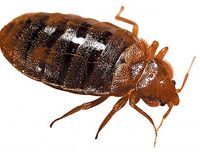
Why are they called bedbugs? Bed bugs get their name from their preferred feeding ground; you whilst you are laying asleep in your bed!
These blood suckers live either in or near beds or other textiles surrounding the bed, crawling up to bite you as you sleep, leaving you with bites and itchy red marks. Under ideal conditions, bedbugs breed and can double in their numbers every 16 days. By now you must have loads of questions, what exactly are bedbugs? Where do they live, how to identify that they are bedbug, and what you should do if you think your home is infested with bedbugs, lets answer some of your questions:
What are Bed Bugs?
Bed bugs are very small, parasitic insects that feed on human blood, usually nocturnal with their visits. Bed bugs are found worldwide, with the common bed bug being the most widespread of the species, and is the one you are most likely to find in your home.
Reports of these pests have been on the rise over the last few decades. Bed bugs spread quickly from place to place, which can make it a problem for everybody, many establishments have had to be closed down for fumigation treatments due to bed bug infestations, including schools, hotels, movie theatres and many other types of commercial businesses have been affected.
So, what do bed bugs look like?
It is important that you can identify bed bugs, especially if you think that you may have an infestation in your home. Bed bugs will look different through the different stages of their life cycle, but tend to be from one to three millimetres in length. Usually, adult bed bugs prior to feeding are oval shaped, reddish or brown in colour and very thin in size, making it easier to squeeze into tight spaces. However, after feeding, bed bug bodies gain in length and are redder in colour.
In the bed bugs nymph stage, they are vary between white, tan, yellowish or nearly transparent and are much smaller than the adult bed bug. Bed bugs feed on blood at all stages of their life cycle.
Signs and Symptoms when the Bed Bug Bites!
If you are waking up in the morning with itchy red bites on your body, it is likely that you’ve been bitten by bed bugs. Some people are more prone to show symptoms from the bed bug bites, however its important to note that not all people’s skin react, so you may have bed bugs even if you don’t notice the bites. However, there are some tell-tale signs of bed bug bites that will alert to you that you have been bitten.
For most people, bed bug bites look like small raised red welts and often appear in lines or clusters of bites, much smaller than mosquito bites, but are usually very itchy.
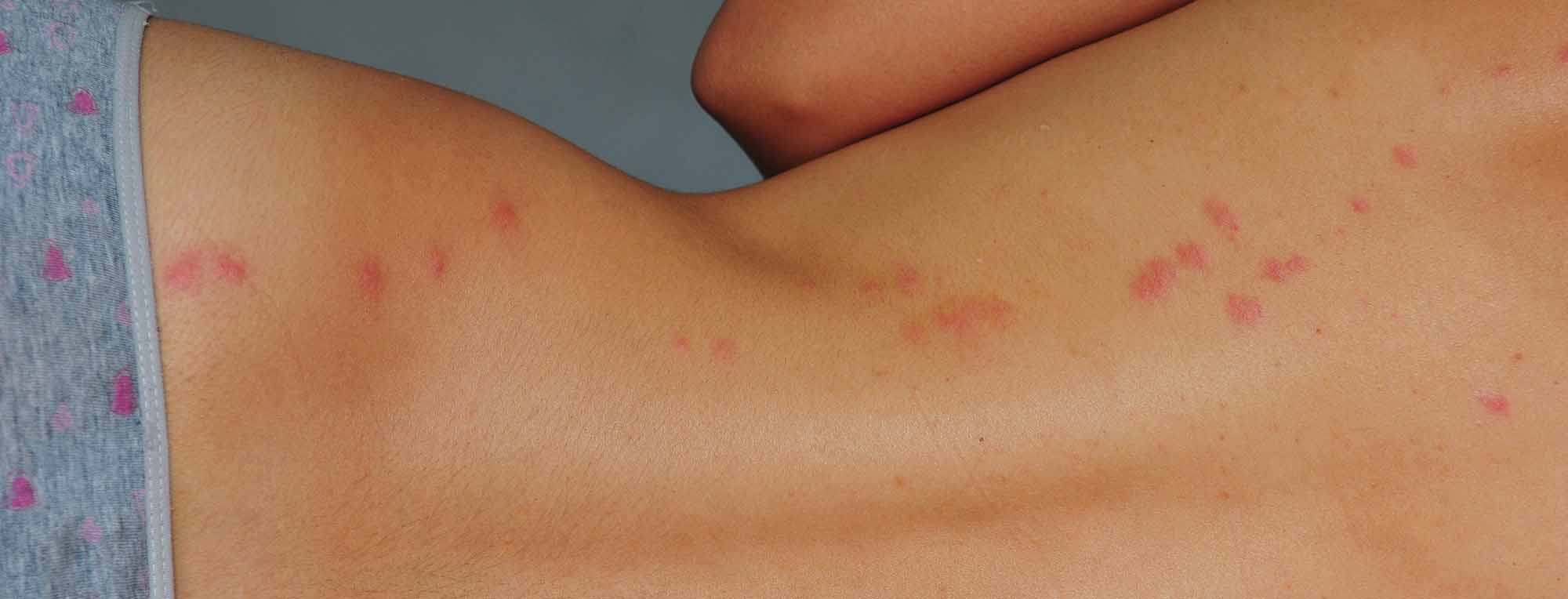
So, are there any risks to your health?
Are bed bugs dangerous to humans? Bed bugs bites can be annoying, but luckily, these pests aren’t known to carry any disease risk, unlike mosquitoes or other parasites. Some people may have an allergic reaction to the bites, or severe scratching of the bites can lead to skin infections.
Bed Bug behaviours and habits explained.
With more information about bed bug behaviour and these pests’ habits can help you prevent them and protect yourself from infestation. Below we’ll look at how and when bed bugs feed and their life cycle:
Feeding habits
Bed bugs will feed on any warm-blooded mammal, however tucking into human flesh can be easier, as we are not covered in a thick fur like our pets or animals. Bed bugs usually feed at night whilst we are asleep, attracted to the warmth from our bodies and the carbon dioxide that we exhale, this invites them to a reliable source of blood to feed from.
Feeding usually as often as once a day, taking only a few minutes to feed before they go back into hiding for the rest of the night.
Bed Bug Lifecycle and Mating Habits
Both nymph and adult bed bugs find their food source from the blood of animals, including humans. The life cycle of a bed bug can be split down into a five-stage growth cycle from nymph to adulthood, over a 37 day period.
As adults, they can survive for about a year, but can be longer dependant on their access to food and the ambient temperature. So it is easy to see how infestations can take hold quickly, with bed bug populations doubling every 16 days, you can easily have thousands of bed bugs in a singe location in no time at all.
Below are more details of the bed bug life cycle:
1st Stage
Bed Bug nymphs are tiny – around a millimetre in length, they are usually whitish in colour and ready to feed as soon as they hatch.
2nd Stage
In this stage of the cycle the be bug grows a little and starts to darken in colour, still tiny they are about to shed their skin and grow again.
3rd Stage
Just as the previous stage the bed bug grows a little more, reaching about 3 millimetres in length.
4th Stage
The bed bug continues to grow, feed and shed its skin, nearly reaching maturity.
5th Stage
The bed bug is now nearly fully grown and must feed and she its skin once more prior to adulthood.
Adult Stage
So there you have it in as little over a month, the bed bug has grown from an egg into an adult. The bed bug is now ready to mate and potentially reproduce hundreds more bed bugs into your home.
Bed Bug Mating Habits
After the male and female bed bugs mate, the female requires a blood meal to produce the eggs. With the female bed bug typically producing 5 – 20 eggs per blood meal, most of these eggs hatch and mature within 37 days. Due to the female being able to store fertilized eggs for some time, female bed bugs can reproduce even when apart from the males.
How do Bed Bugs Spread?
Reproducing at a rapid rate, bed bug infestations can spread quickly, especially in homes, they can climb in tiny cracks and stay hidden until they are ready to feed.
Bed Bugs are notorious hitchhikers, clinging to your clothes, shoes or luggage when travelling, setting up a nest wherever they happen to land. This is why they can be such a nuisance in hotels, office buildings, schools and other public buildings.
So, what is the main cause and where do they hide?
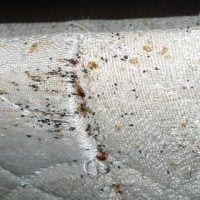
Bed bugs are not fussy, they do not prefer dirty homes over clean homes, they don’t care where they nest, all they need is access to a blood supply.
They are attracted to humans due to the carbon dioxide they exhale whilst they are sleeping, having one mission to feed on your blood!
Bed Bugs will cluster together near their human host’s bed, this way they don’t have to travel far to feed. They hide in extremely tight spaces, which makes them difficult to get rid of. If you miss any bed bugs hiding in nearby furnishings, wallpaper, carpets or soft furnishings, they can re-establish extremely quickly and you can be re-infested in a matter of weeks.
Common places they hide include electrical sockets, bed frames, mattresses, sofa cushions and pillows, basically anywhere there can’t be disturbed. They will quickly come out to feed and hide away again until they are hungry again.
Apart from bites, what other signs are there?
There are a few common signs apart from bites, dark stains on your bed sheets – which may be their faeces, blood stains on your nightwear, bed bugs eggs, shells where they have shed their skin and in some cases live bed bugs, even though these are less commonly seen.
What to do if you find an infestation?
Bed bugs can be extremely difficult to eradicate, if you think you have bed bugs in your home , its important to call a professional pest controller and a professional treatment is strongly recommended to ensure the problem is eradicated.
Should you think that you have a bed bug infestation or would like some advice, call a professionals to treat the invasion immediately, do not delay call the professionals to treat the invasion immediately don’t let the situation get out of control. Bed bugs can be nasty call a professional pest control service to treat the problem now.. 0207 205 2229 Pest2Kill Bed Bugs in London and Essex


